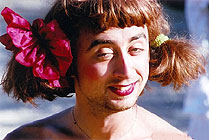|
|
|
|
Ma
vie en rose
|
 |
|
Poor little Ludovic (Georges Du Fresne). From very early on in life, he senses that, inside, he is really a girl. And he wants to dress and behave accordingly. That is already distressing enough for his parents, Hanna (Michèle Laroque) and Pierre (Jean-Philippe Écoffey). But the real freak-out occurs when Ludovic starts to express his innocent, tender, romantic longings for the boy he dreams of one day marrying. We see very few Belgian films in Australian cinemas these days. Ma vie en rose will not exactly open the import floodgates. Director and co-writer Alain Berliner offers a sweet, well-intentioned piece of whimsy full of super-saturated, sickly pastel colours and obvious, sometimes clumsy humour. The film's heart is certainly in the right place. Berliner's evident compassion for Ludovic's plight finds perfect expression in the marvellous performance by Du Fresne. The oldies – divided into a mass suburbanites who repressively disapprove of the boy and a lone, life-affirming grandmother (Hélène Vincent) who encourages him – do less well. Ma vie en rose is the softest, least threatening film about gender politics imaginable. Even the Hollywood comedy In & Out (1997) has more outrageousness and bite. Common to both films is a '"feel good" narrative device difficult to present well: miraculous moments of reversal in which hitherto conservative or cowardly characters begin "acting up" in a courageous or progressive manner. To be fair, the movie's tone is not unconditionally sunny. Indeed, as in Totò the Hero (1991) or Léolo (1992), much depends on the young hero's absorption in a fantasy world – in this case, a dream constructed around "Pam", a surreal children's television hostess. Ludovic's attachment to this fantasy is inherently ambiguous: it gives his life hope and a utopian dimension, but it also suggests an unhealthy withdrawal from a difficult reality. A better film would have extracted tension and wonder from this ambiguity. In Ma vie en rose, however, such an intriguing possibility quickly dissipates – just like its good-natured wit and its impeccably worthy political agenda. © Adrian Martin February 1998 |
![]()